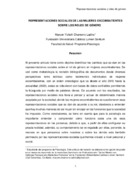Mostrar el registro sencillo del ítem
Representaciones sociales de las mujeres excombatientes sobre los roles de género
| dc.contributor.advisor | XX | |
| dc.creator | Chamorro Ladino, Maryen Yulieth | |
| dc.date.accessioned | 2021-10-26T01:25:18Z | |
| dc.date.available | 2021-10-26T01:25:18Z | |
| dc.date.created | 2021 | |
| dc.identifier.uri | http://hdl.handle.net/20.500.12237/2214 | |
| dc.description | El presente artículo tiene como objetivo identificar los cambios que se dan en las representaciones sociales sobre el rol de género en mujeres excombatientes. Se usó como metodología la revisión bibliográfica de documentos desde diversas perspectivas tanto teóricas como testimonios individuales de mujeres excombatientes, con un orden cronológico que va desde el año 2010 hasta la actualidad (2020), estas se obtuvieron con bases de datos confiables permitiendo la búsqueda por medio de palabras claves. De acuerdo con los resultados, las representaciones sociales nos lleva a pensar y actuar de determinada manera aceptada por la sociedad, donde las mujeres excombatientes se cuestionaron esas representaciones sociales que se dan de acuerdo a su rol, dándonos a entender que hay muchas maneras de ser mujer sin encajar en las funciones que la sociedad ha impuesto. Como conclusiones, se tiene en cuenta que para la psicología es importante entender y comprender cómo funciona cada una de esas representaciones en las personas, debido a que, a partir de ellas configuran su propia realidad, además, su comportamiento se ve regulado por ellas, por ende, la manera en que pensamos sobre nosotros o sobre los demás esta también permeada por las representaciones sociales que hemos creado a nivel personal y social. | spa |
| dc.description.abstract | This article aims to identify the changes that occur in social representations about the gender role of women ex-combatants. The methodology used was the bibliographic review of documents from various theoretical perspectives as well as individual testimonies of women ex-combatants, with a chronological order ranging from 2010 to the present (2020), these were obtained with reliable databases allowing searching using keywords. According to the results, social representations lead us to think and act in a certain way accepted by society, where women excombatants questioned those social representations that are given according to their role, giving us to understand that there are many ways of being a woman without fitting into the roles that society has imposed. As conclusions, it is taken into account that for psychology it is important to understand and understand how each of these representations works in people, because, from them they shape their own reality, in addition, their behavior is regulated by them, Therefore, the way we think about ourselves or others is also permeated by the social representations we have created on a personal and social level. | spa |
| dc.format.mimetype | application/pdf | spa |
| dc.subject | Rol de género | spa |
| dc.subject | Mujer excombatiente | spa |
| dc.subject | Representaciones sociales | spa |
| dc.title | Representaciones sociales de las mujeres excombatientes sobre los roles de género | spa |
| dc.subject.subjectenglish | Gender rol | spa |
| dc.subject.subjectenglish | Ex-combatant woman | spa |
| dc.subject.subjectenglish | Social representations | spa |
| dc.rights.accessRights | info:eu-repo/semantics/openAccess | spa |
| dc.creator.degree | Psicóloga | spa |
Ficheros en el ítem
Este ítem aparece en la(s) siguiente(s) colección(ones)
-
Psicología [203]

